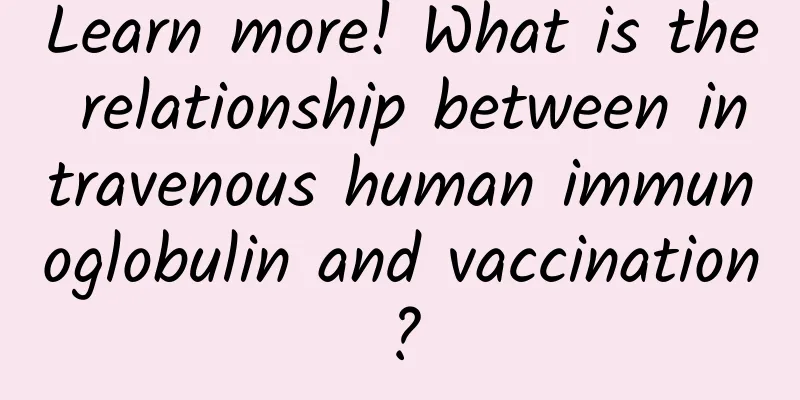Learn more! What is the relationship between intravenous human immunoglobulin and vaccination?

|
When your baby is vaccinated, the doctor will always ask: Has your child taken any medicine recently? At this time, mothers may have a little doubt in their minds, which drugs will affect vaccination? Common drugs that affect vaccination include glucocorticoids, antibiotics, immunosuppressants, cytotoxic drugs and antibodies such as intravenous human immunoglobulin. Today, the pharmacist will take you to understand the impact of intravenous human immunoglobulin on vaccination. What kind of medicine is intravenous human immunoglobulin? Intravenous human immunoglobulin is a combination of immunoglobulins separated and extracted from normal human plasma. It contains broad-spectrum IgG antibodies against viruses, bacteria or other pathogens. The unique type and unique antibody of immunoglobulin can form a complex immune network, which has the dual therapeutic effects of immune replacement and immune regulation. After intravenous injection, it can quickly increase the IgG level in the recipient's blood and enhance the body's anti-infection ability and immune regulation function. In a word, human immunoglobulin helps the body improve or regulate immunity. What types of illnesses in children are treated with IV human immune globulin? Children are often a group with relatively low immunity, and when they suffer from the following diseases, they need supportive treatment with human immunoglobulin, such as Kawasaki disease, idiopathic thrombocytopenic purpura, severe infection and neonatal sepsis, primary immunoglobulin deficiency, rheumatoid arthritis, autoimmune-mediated simple red cell aplasia, hemophilia, etc. What should I pay attention to when vaccinating my baby after he has used intravenous human immunoglobulin? Vaccines are divided into inactivated vaccines and attenuated vaccines. I wonder if mothers know which ones are inactivated and which ones are attenuated? What is the relationship between inactivated or attenuated vaccines and intravenous human immunoglobulin? 1. Inactivated vaccines are easy to understand. After obtaining the virus, it is inactivated by high temperature or chemical reagents, leaving only the external characteristics, and then inoculated into the human body. The immune system will recognize the characteristics of the dead virus, and when it encounters the same live virus in the future, it will activate specific immunity and eliminate the virus. Inactivated vaccines include: rabies vaccine, inactivated polio vaccine, inactivated hepatitis A vaccine, inactivated Japanese encephalitis vaccine, 13-valent pneumococcal conjugate vaccine, 23-valent pneumococcal polysaccharide vaccine, Haemophilus influenzae conjugate vaccine (Hib), acellular diphtheria, pertussis and tetanus vaccine, pertussis vaccine, group A meningococcal polysaccharide vaccine, group A+C meningococcal polysaccharide vaccine, group A+C meningococcal conjugate vaccine, etc.
It is important to emphasize that for babies who have received intravenous human immunoglobulin, inactivated vaccines must be used for vaccination within 3 months. If inactivated vaccines are not available, the interval between attenuated vaccines must be noted, and certain live attenuated vaccines can only be administered after 3 months. |
<<: Aluminum phosphate gel - edible gel
>>: Healthy diet and prostate cancer
Recommend
What causes left breast pain during breastfeeding?
If you experience pain in your left breast during...
How long after giving birth can I do Kegel exercises?
How long does it take to recover from postpartum ...
Is hysteroscopic uterine curettage successful?
It is common for most women to have incomplete bl...
How many months can you take Diane 35 to regulate menstruation?
Key reminder: Menstrual irregularities are a comm...
Use these methods to treat postpartum cough
After going through the difficult childbirth proc...
What can a woman who is too thin eat to gain weight
Eating some snacks regularly can soothe your sple...
What does a small amount of cervical fluid mean?
If some pregnant women have problems with their b...
Can I eat chicken legs during menstruation?
Can you eat chicken legs during menstruation? In ...
Where to apply moxibustion for chronic pelvic inflammatory disease
Chronic pelvic inflammatory disease is very diffi...
What causes irregular menstruation after childbirth?
After giving birth, mothers will not have menstru...
What to do with vaginal pain? Do you know these methods?
The vagina is a particularly private and sensitiv...
How to hide apps on VIVO phones? Where to see the model of VIVO phones
vivo is committed to creating smart products with...
Can you have sex during pregnancy?
In the first three months of pregnancy, you shoul...









